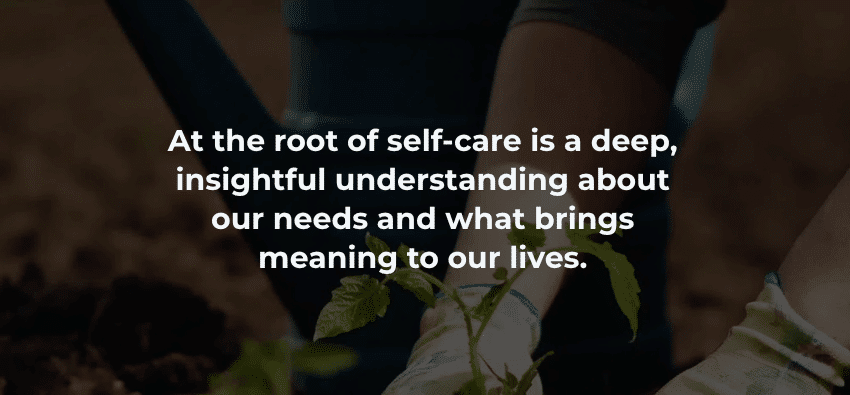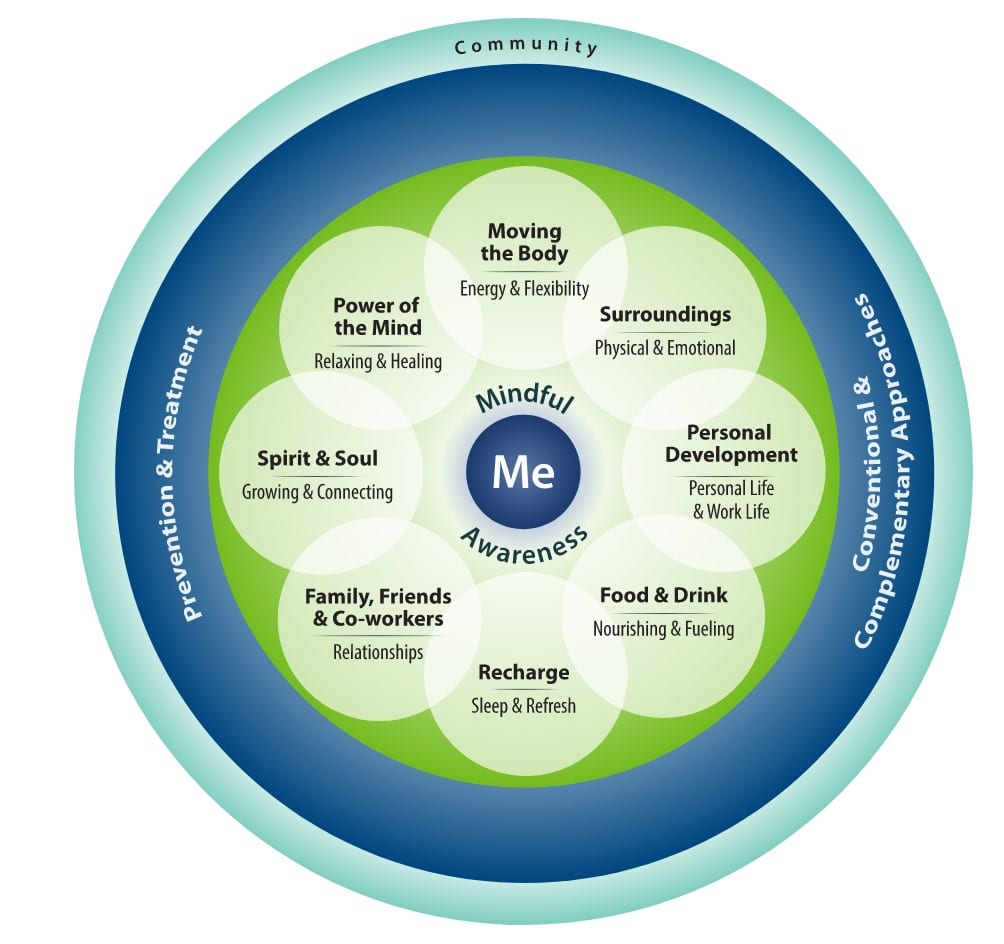How are you feeling today? Right now? Do you feel… Okay? Safe? Happy? Do you feel like you can cope with stressful situations if something were to arise in your life right now? If you answered “no” to any of these questions, are you able to pinpoint exactly what you need in your life, exactly at this moment?
Being able to identify what we need to feel healthy, content, safe and secure is what self-care is all about. At the root of self-care is a deep, insightful understanding about our needs and what brings meaning to our lives. It’s also about developing the internal, psychological resources in your toolbox so that you can handle stressors when they pop up.
Taking care of ourselves is an act of deep love. It is an act of deep love to treat your body well, such as by eating well and exercising. It is also an act of deep love to take yourself out of toxic situations and to want to live in a safe community. It is also an act of love to engage in practices that restore and rejuvenate our minds and hearts. Caring for ourselves is also a necessary part of being able to care for others -- we can’t show up as our best selves in our relationships or in our jobs if we are depleted. By learning to love and care for ourselves, we can have the resources to fully love and care for others.
Awareness is at the core of practicing self-care. It means understanding and connecting with your heart, your mind, your body, your loved ones, your community, and your world.

What is Self Care?
The International Self-Care Foundation (ISF) uses the definition created by the World Health Organization in 1998 to define “self-care:”
“Self-care is what people do for themselves to establish and maintain health, and to prevent and deal with illness. It is a broad concept encompassing hygiene (general and personal), nutrition (type and quality of food eaten), lifestyle (sporting activities, leisure, etc.), environmental factors (living conditions, social habits, etc.) socio-economic factors (income level, cultural beliefs, etc.), and self-medication.” (source)
There are many organizations that aim to illustrate how mindful awareness supports all aspects of self care and healthy living. We like this graphic, from the U.S. Department of Veterans Affairs, but there are many others that provide a framework for the process.

As you read these categories, what areas of self-care are your strengths and what areas are you struggling with? What elements do you have control over, and what elements are outside of your control?
Interestingly, unhealthy behaviors tend to “cluster” together with some people and also in certain parts of a population. You may be predisposed to healthy or unhealthy behaviors based on genetics, age, gender, socio-economic class, geography, and many other factors. This doesn’t mean that anyone is doomed to be unhealthy–on the contrary! In fact, if you work hard to be healthy in one area (i.e., exercising more), you are likely to be healthy in other areas as well (i.e., eating more healthfully or stopping smoking). In this way, positive behaviors can have a snowball effect: practice one healthy and happy habit, and the others will follow.
Why is Self-Care Important?
Good self-care helps you be healthy, resourced, and safe right now, in the present moment. What’s more, regular self-care builds healthy habits and a kind of “warehouse” of healthy tools; these tools help to ward off illness and get you through difficult, stressful moments. These tools help to keep you healthy and safe not just right now but in the future as well.
Self-care can be spontaneous—like canceling evening plans with friends because you really need a night to relax and go to bed early. But self-care can also be formal and structured, providing you with a plan for optimizing your health. Such a roadmap can also assist you in identifying pitfalls and creating a strategy for avoiding those potential areas for problems.
Good self-care can be linked to lower stress, lower risk of illness, better coping during times of illness, increased energy, and better connections with other people.
Mindfulness practices are tools that we can use to support stress management and overall wellbeing. Mindful awareness can also be an excellent tool to identify what you really NEED in your life right now. Mindfulness can also be used to help you craft a plan to prevent unhealthy activities in the future.
Social Connection is a Big Part of Self-care
One aspect of self care that gets overlooked is the importance of social connection to our health and well-being. We need to feel loved and supported, and we also need to regularly practice loving and supporting others in order to be emotionally balanced. There are many tangible benefits when you connect with other people, including reduced anxiety and depression as well as greater feelings of self-worth.
Having a social network is important -- especially during times of crisis.
Friends can also be there to support you in doing routine healthy activities, like cooking a healthy meal together or going for a walk. It’s important to remember that crafting healthy connections with others requires you to support them, too. It’s a give-and-take balance, so it’s important to carve time out of your schedule to keep these connections vibrant.
Connecting is not all about life-long friendships.
Connecting with others can be as simple as offering a genuine smile to a stranger in a store. Volunteering can also be a rewarding experience, even if you are among strangers. You can still receive many health benefits in these roles just by finding small ways to give back to others.
Connecting is not all about human connection, either.
Getting a pet is one way that you can cultivate healthy connections. Pets are great sources of unconditional love, but they also require that you commit time and energy to build a relationship with them as well. Pets like dogs also offer a great excuse to get outside, walk and meet other people as well.
Mindfulness, Self-care and Professional Therapy
Self-care is the practice of taking an active role in your own well-being and happiness. This is a broad, catch-all term that encompasses a lot of ground, such as getting good sleep and stretching throughout the day. Self-care is not the same thing as professional therapy.
Mindfulness is the practice of being aware of what is going on in the current moment with an attitude of curiosity and openness. Mindfulness is one aspect of self-care, just like going to the gym or eating healthfully are other self-care actions.
Professional therapy is the act of working with a trained therapist to achieve personal goals, such as mental health, wellness, education, and career goals. Working with a professional therapist is yet another aspect of self-care, and a professional therapist might choose various mindfulness techniques as part of your care and treatment plan.
Self-care incorporating mindfulness, augmented with professional therapy can work beautifully in tandem with one another. That said, it is important to note that self-care alone won’t heal trauma or acute mental health needs.
Working with a professional therapist is the best way to achieve those more critical mental health needs. However, for less critical (in a “crisis” sense) health and well-being, developing a mindfulness practice and self-care practice can help you work towards a healthier you. Mindfulness and therapy can also work in tandem to support the work you can do in therapy.
There are many benefits to using mindfulness as part of your self-care, such as the fact that it’s free and can be done anytime, anywhere. Remember that there are limitations to self-care though. Self-care only goes so far, and if you have emotional obstacles, a history of trauma, or are dealing with abnormally large life stress, then it’s a good idea to reach out to a professional therapist for help.
When might you consider working with a professional therapist?
- If you are feeling overwhelmed and don’t know where to start doing self-care activities.
- If you have a history of trauma, which might prevent you from identifying what healthy self-care should look like.
- If you are currently experiencing a severely stressful situation that is impacting your day-to-day life.
- If trying to get still and practice mindfulness makes you more anxious and panicky.
There are many resources to help you find a therapist. If you are not sure, talk to your General Physician (GP) to discuss if therapy might be right for you.
How to Practice Self-care with Mindfulness
Mindfulness is the practice of paying attention to what’s going on in your body, heart, mind, and life in the present moment. It might involve asking yourself “how do I feel right now?” and looking deeply at the answers. It’s also about being open and curious (not judgmentally) with the answers you find. Mindfulness encourages us to be aware but with a quality of gentleness and compassion. Mindfulness supports us to love ourselves.
How can you practice self-care with mindfulness? Here are some practices we recommend and use in our programs.
Connect with your body
Self love is realizing—with joy!—what a wonder your body is. (Try this great lower body awareness guided meditation.)
Release tension in the body
One excellent way to release tension is to practice tensing and relaxing, which allows us to relax our muscles. This also helps to grow our awareness around how we hold stress. Another soothing practice is 7-11 breathing, slowly extending the outbreath longer than the inbreath.
Slow breathing stimulates your vagus nerve and, with some people, can shift the nervous system towards a more calm and restful state. Slow breathing can also result in lower heart rates and lower blood pressure.
Cultivate compassion and gratitude in your body, mind, and heart
Loving Kindness meditation is one way you can practice feeling grateful and generate compassion. The result of this meditation is often that you can begin to develop love for yourself as well as others.
Practice saying “no”
Notice what brings you joy and fills you up, and, as you are able, say no to those things that drain you. Saying “no” might also mean unplugging from technology for a few hours or for a few days to create space for self-care practices, reflection and rest. Consider doing fewer activities, but doing the ones you keep on your to-do list with focus and care.
Slow down
Slowing down whatever activity you are doing right now and really noticing how it is to be fully present can be a mindfulness practice in and of itself. Here is an example of how to eat more mindfully.
Remember: self-care and mindfulness isn’t something that you do just when you are on vacation. It’s something you can do right now, tonight when getting ready for bed, and tomorrow morning when getting ready for work. Mindfulness—and self-care—are both practices that you get better at as you do them over-and-over again.
Daily Self-Care Practice
Here are some ways to build a daily self-care practice.
Making sure your basic needs are met first. This might look like packing a healthy lunch or snacks to be sure you eat during the workday, getting plenty of sleep, drinking enough water, seeing a doctor/dentist annually, or applying for assistance if you are in need of support in meeting your basic needs on your own.
Scheduling it! Add your self-care practices to your calendar so that they are a priority in your day. Create a schedule where self care items make the list as a priority in your day. Healthy actions will look different for every person, but these might include going for a walk, stretching/yoga, meditation, eating/preparing meals, making an appointment to see a therapist, practicing art, or calling a loved one. Putting these items on your calendar means that you have a better chance of getting them done. Pro tip: Use your lunch break as time for personal nourishment. This is a great time to take a nap, go for a walk, call a friend, or just eat your lunch mindfully.
Getting outside to connect with nature. Even if it is 5 minutes on your front door stoop. Take a look around and engage your senses. What do you hear? See? Smell? Feel? Touch? Just feeling sunlight on our face can also have a calming effect.
Asking for help. It’s okay to ask for help, whether that’s watching the kids for an hour, doing work around the house, talking to a therapist, or getting support at work. In fact, it’s a great way to connect with other people! On the flip side, finding time in your week to help other people is a great way to connect, as well
Other ideas to care for yourself include: Reading for pleasure, taking a long bath, getting a massage, dancing or singing to your favorite song, finding an online course to explore a topic or a hobby you’re interested in, scheduling a visit to a museum or other place that inspires you, regularly scheduling time to do something that brings you joy!
Awaken Can Help You Get Started With Mindfulness Self-Care
Awaken Pittsburgh helps organizations and individuals seeking resources for developing healthy self-care habits using evidence-based, scientifically-backed approaches. Please consider us a resource for any of your individual or organizational needs.
Groups and participants we have worked with have reported:
- Reduced stress, at statistically significant levels.
- Reduced secondary trauma and Compassion fatigue.
- Increased resilience and ability to bounce back from difficult times.
- Increased workplace satisfaction and perceived increase in quality of life.
We offer these additional resources for free, at-home practice:
- Video series
- Online resources
- Suggested reading
- In-depth research studies
Mindful Connections™
Through our proprietary curriculum, Mindful Connections™, we offer essential, evidence-based mindfulness training designed to meet many needs—from individuals looking to deepen their practice, to educators, to public safety teams and others working in high-stress professions.
Led by experts in their fields and grounded in the latest findings in neuroscience and dialectical behavioral therapy, Mindful Connections™ programs are a proven path to powerful and lasting transformation.
Our introductory series is geared towards beginners, introducing a spectrum of practices that can benefit all levels. In addition, we offer programs specific to intermediate and advanced practitioners.



